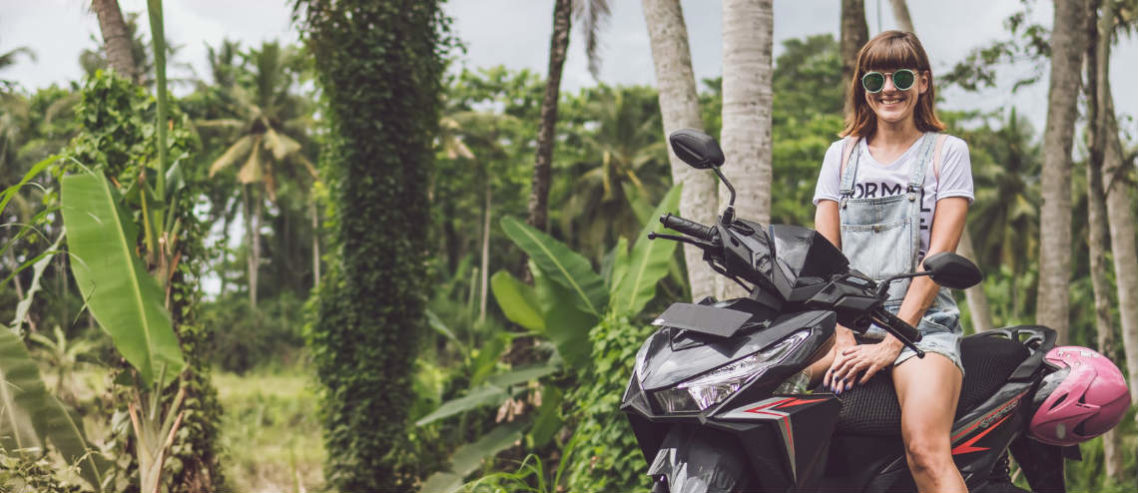6 motorbike safety tips
While motorbikes and scooters are Thailand’s most popular mode of transport, the two-wheeled vehicles aren’t necessarily the safest. Powered by a motor and free of pedals, almost anyone is capable of getting a motorbike going. But there is much more to riding one than accelerating, braking, and checking the side mirrors – especially when it comes to your personal safety and the safety of those around you.
With the deadliest roads in Southeast Asia, the reliable and seemingly simple way of getting around Thailand can come at a cost. Even so, motorbikes offer one of the quickest, most reliable, and most affordable ways to travel within the country. While there are certainly perks to riding a motorcycle, you should not go anywhere near one without having the correct health insurance. If motorbikes are your transportation of choice in Thailand, these tips can help make your journey safer and more comfortable.
1. Wear a helmet
Telling someone to wear a helmet when they get on a motorcycle might sound as redundant as telling someone to put on their seatbelt when they get in a car, but it’s worth repeating. Even though many people ride without wearing a helmet in Thailand, that doesn’t mean it is a habit you should adopt. After all, simply wearing a good helmet can save your life. Forget about the flimsy helmets that do nothing more than help you avoid a fine and invest in a good helmet to protect your head in case it ever makes contact with the road or an unexpected object.
2. Dress for the fall, not the ride
While professional riders realize the importance of wearing appropriate clothing, amateurs often don’t. It’s common to see tourists wearing sleeveless tops, swimming shorts, and flip flops while zipping around. Likewise, locals are often seen wearing short skirts, high heels, and other inappropriate motorbike attire. To minimize damage from falling off a motorbike, it’s best to cover your skin as much as possible.
Make it a habit to wear long pants and a jacket or long top before you get on a bike. The same goes for shoes – which should cover your feet as much as possible. Basically, any part of your skin that is exposed is more vulnerable if you should ever come off your bike, so dress accordingly.
3. Don’t assume
Whether you’re a novice or an expert, the same rule applies to Thai roads: never assume. Road conditions, other driver’s skills, and other factors can vary each time you get on the road. Always stay alert and observe everything that’s going on around you, in every direction. It’s common for vehicles to brake or turn erratically, run red lights, drive down the wrong side of the road, and pull out into oncoming traffic.
Even veteran riders who have years of experience can still be shocked by what happens on the roads in Thailand. When riding, be aware that anything and everything can happen, and keep a vigilant eye out at all times.
4. Practice first
The simplicity of a motorbike and how it functions gives beginners false hope in their riding skills. While riding is quite simple once you get the hang of it, things can go very wrong very quickly when you combine inexperience, power, and speed. Most motorbike rental places in Thailand do not even check if you have a license, so it’s up to the rider to decide if they are fit to ride.
It’s scary how many times a new rider twists the accelerator and heads straight into concrete or flies into traffic. Don’t be one of those people. If you can’t take lessons before riding, at the very least get someone to show you how things work and practice riding around in a safe area like a parking lot before driving away on your own.
5. If you’re not confident, don’t do it
If you’ve never ridden a motorcycle or don’t have one of your own back at home, learning to ride in Thailand might not be the best idea. Maneuvering a motorbike in Thailand can even be challenging for experienced motorcyclists. There are many other modes of transport that can get you from A to B, such as taxis, buses, and trains. You do not have to ride a motorbike in Thailand just because it seems like everyone else is doing it. If you are not confident in your skills, choose another way to get around.
6. Check your insurance
Accidents happen all the time all over the country, affecting locals, expats, and tourists alike. Tourists who have to go to the hospital in Thailand can be stuck with growing hospital bills and an insurance company that will not pay out because they did not have a proper motorcycle license. What’s worse is some tourists have no insurance at all. Even if you have international health insurance for Thailand, it is important to check the fine print since some policies do not cover driving on motorbikes in the country.
If you’re ever involved in an accident in Thailand, knowing that your health insurance will cover the costs is incredibly reassuring. With that said, expats should also have expat health insurance in Thailand to help cover unforeseen medical costs.
Pacific Prime is a reputable insurance broker in Thailand that can help compare health insurance policies to ensure you get the best one for your needs at an affordable cost. Contact us for expert insurance advice or a free quote today.
- Premarital Checkup: What It Is and Why It Matters - September 20, 2023
- An Expat’s Guide to Dental Care and Insurance in Thailand - September 11, 2023
- The Best Neighborhoods for Expats in Bangkok - July 27, 2023





Comments
Comments for this post are closed.